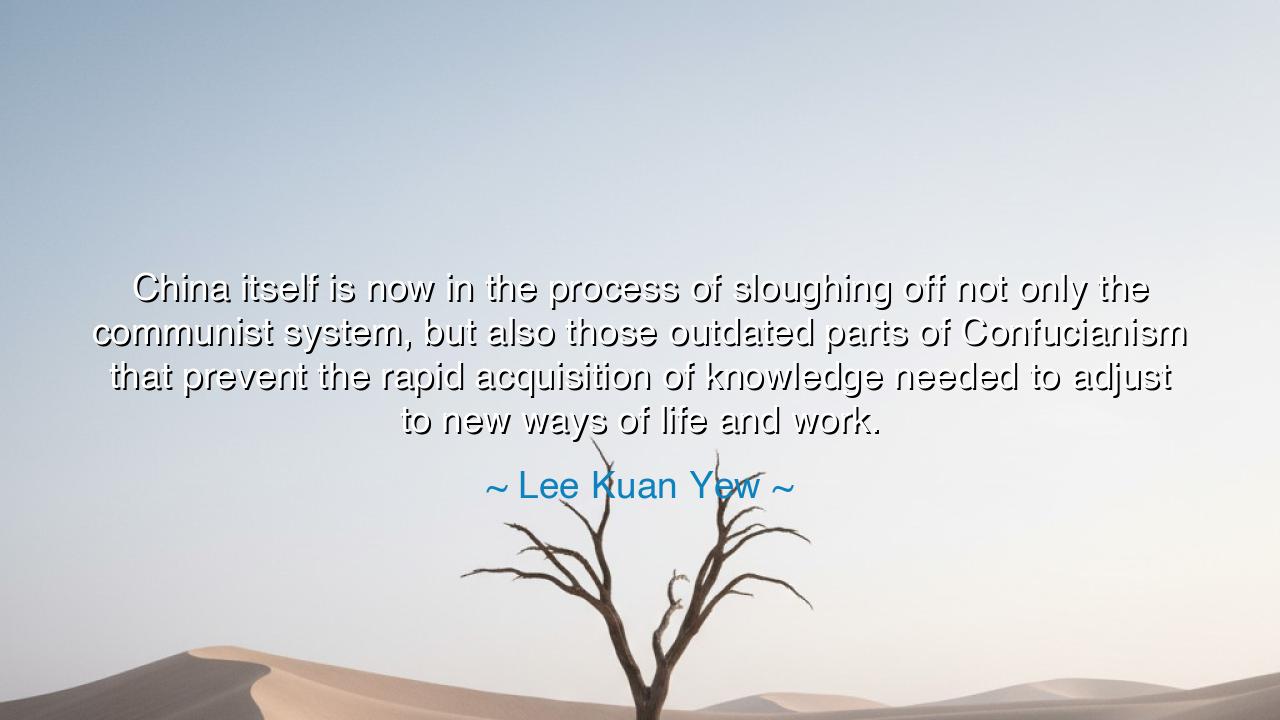
China itself is now in the process of sloughing off not only the
China itself is now in the process of sloughing off not only the communist system, but also those outdated parts of Confucianism that prevent the rapid acquisition of knowledge needed to adjust to new ways of life and work.






The words of Lee Kuan Yew—“China itself is now in the process of sloughing off not only the communist system, but also those outdated parts of Confucianism that prevent the rapid acquisition of knowledge needed to adjust to new ways of life and work”—speak with the insight of a statesman who understood that civilizations, like men, must shed their old skin to survive. Beneath these words lies a profound truth about transformation: that progress demands both continuity and renewal, that nations—like the human spirit—must learn when to honor tradition and when to transcend it. Lee, the founding father of modern Singapore, was not speaking as a critic, but as one who had seen the East wrestle with modernity, and knew that the secret of greatness lay in the courage to evolve.
In this reflection, China becomes not merely a nation, but a symbol—a vast and ancient being awakening from a long sleep, shaking free the dust of history. Lee saw that for China to rise again, it could not remain bound by the rigidities of either Communism or the more static aspects of Confucianism. The former had restrained its spirit through political conformity; the latter, in its ossified form, had sometimes limited inquiry and innovation in the name of harmony and hierarchy. To “slough off” these systems was not to reject them entirely, but to cast away their outworn elements, as a serpent sheds its skin so that new life may emerge beneath. The message is timeless: no nation, no culture, no person can grow without the pain of shedding what has become too small for the spirit that now inhabits it.
Lee’s observation must be understood in the light of his own experience. He had watched the Asian Tigers—Singapore, South Korea, Taiwan, Hong Kong—rise from poverty through discipline, education, and adaptability. He knew that Asia’s strength lay in its cultural roots—respect for learning, for family, for order—but also that its weakness lay in rigidity, in excessive reverence for the past. China, he understood, possessed the genius of its people and the weight of its heritage. Yet for centuries it had been confined by forms of thought that discouraged questioning, experimentation, and individual initiative. In the modern age, where knowledge is power and innovation the lifeblood of prosperity, these habits could no longer remain unchallenged.
Consider the example of Japan in the Meiji era. In the late 19th century, Japan faced the same dilemma: whether to cling to its feudal traditions or to embrace the modern world. Its leaders, with courage and foresight, chose transformation. They sent scholars abroad, built industries, reformed education, and in a generation turned their island into a modern power. Yet they did not discard their spirit—they preserved the ethic of discipline and collective purpose while discarding what no longer served the age. Lee’s insight mirrors this lesson: greatness lies not in the blind worship of the past, nor in its total rejection, but in the wise discernment of what must remain and what must go.
When Lee speaks of “the rapid acquisition of knowledge,” he touches on the heartbeat of modern civilization. In the ancient world, knowledge was the treasure of a few; in our time, it is the foundation of all progress. The speed at which societies learn—how quickly they adapt their minds, their systems, their values—determines whether they flourish or fade. China’s journey, as Lee described it, is not merely political or economic; it is spiritual. It is the transformation of a collective consciousness, the awakening of a people to the necessity of change. The act of shedding old systems is not destruction—it is renewal. The Confucian ideals of respect, education, and order must endure, but their forms must evolve to serve a new age of invention and inquiry.
There is a lesson here for all who live in times of upheaval. Whether in nations or in individual lives, clinging to the obsolete is a slow form of death. The wise must learn to discern between the eternal and the temporary, between values that sustain and customs that imprison. Just as China must adapt to the new realities of the global age, so too must each of us learn to cast off the internal dogmas that hinder growth—the fear of change, the comfort of conformity, the reverence for the familiar. Renewal is never painless, but it is the law of life itself.
Thus, Lee Kuan Yew’s words endure as both prophecy and counsel. He speaks not only of China’s transformation but of the universal journey of civilizations and souls alike. Every people, every generation, must undergo its own metamorphosis—must shed its skin, its illusions, its outdated beliefs, to make room for the expansion of its understanding. Let us, then, follow the wisdom within his insight: honor the past, but do not be enslaved by it; embrace change, but do not lose your soul in the process. For only through such balance does true progress arise. And in the end, as Lee knew well, the destiny of nations and of individuals alike depends upon this sacred art—the art of letting go that we may grow.






AAdministratorAdministrator
Welcome, honored guests. Please leave a comment, we will respond soon